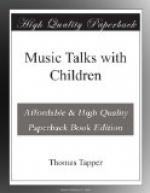There is still another form of writing which is neither strictly harmonic, nor strictly contrapuntal,—it is a combination of both. There is not the plain unadorned harmonic progress as in the simple choral, nor is there the strict voice progression as in the works of Bach. This form of writing which partakes of the beauties of both the others has been called the free harmonic style. It has been followed by all the great masters since the time of Bach,[48] even before, indeed. If you can imagine a beautiful song-melody with an artistic accompaniment, so arranged that all can be played upon the piano, you will understand what the third style is. It is wonderfully free, surely; sometimes proceeding in full free chords, as in the opening measures of the B flat Sonata of Beethoven,[49] again running away from all freedom back to the old style, until the picture looks as old as a monkish costume among modern dress.
All of the great sonatas and symphonies are of this wonderfully varied form of writing. How full it can be of expressiveness you know from the Songs without Words by Mendelssohn, and the Nocturnes of Chopin; how full of flickering humor you hear in the Scherzo of a Beethoven symphony; how full of deep solemnity and grief one feels in the funeral marches.[50]
This school of composition has been followed by both the greater and the lesser masters. Every part is made to say something as naturally and interestingly as possible, being neither too restricted nor too free. Then, in playing, both hands must be equally intelligent, for each has an important part assigned to it.
The great good of study in harmony and counterpoint is that it increases one’s appreciation. As soon as we begin to understand the spirit of good writing we begin to play better, because we see more. We begin, perhaps in a small way, to become real music-thinkers. By all these means we learn to understand better and better what the meaning of true writing is. It will be clear to us that a composer is one who thinks pure thoughts in tone, and not one who is a weaver of deceits.
CHAPTER XV.
MUSIC AND READING.
“Truly it has been said, a loving
heart is the beginning of all
knowledge.”—Thomas
Carlyle.
A beautiful thing in life is the friendship for books. Every one who loves books pays some day a tribute to them, expressing thankfulness for the joy and comfort they have given. There are in them, for everybody who will seek, wise words, good counsel, companies of great people, fairies, friends for every day, besides wonders we never see nor dream of in daily life.
Some of the great men have told us about their love for books; how they have saved penny by penny slowly to buy one, or how after the day’s labor a good book and the firelight were prized above anything else. All tell us how much they owe to books and what a blessing books are. Imagine the number of heart-thoughts there must be in a shelf full of good books! Thoughts in tones or thoughts in words may be of the heart or not. But it is only when they are of the heart that they are worthy of our time.




